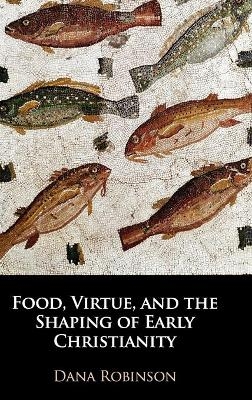
Food, Virtue, and the Shaping of Early Christianity
Seiten
2020
Cambridge University Press (Verlag)
978-1-108-47947-9 (ISBN)
Cambridge University Press (Verlag)
978-1-108-47947-9 (ISBN)
This book shows that food was formative for early Christian development beyond the Eucharist. Greco-Roman food culture provided a network of metaphorical concepts and spatial practices which allowed lay people to participate in important debates over Christian living and community formation.
In this book, Dana Robinson examines the role that food played in the Christianization of daily life in the fourth century CE. Early Christians used the food culture of the Hellenized Mediterranean world to create and debate compelling models of Christian virtue, and to project Christian ideology onto common domestic practices. Combining theoretical approaches from cognitive linguistics and space/place theory, Robinson shows how metaphors for piety, such as health, fruit, and sacrifice, relied on food-related domains of common knowledge (medicine, agriculture, votive ritual), which in turn generated sophisticated and accessible models of lay discipline and moral formation. She also demonstrates that Christian places and landscapes of piety were socially constructed through meals and food production networks that extended far beyond the Eucharist. Food culture, thus, provided a network of metaphorical concepts and spatial practices that allowed the lay faithful to participate in important debates over Christian living and community formation.
In this book, Dana Robinson examines the role that food played in the Christianization of daily life in the fourth century CE. Early Christians used the food culture of the Hellenized Mediterranean world to create and debate compelling models of Christian virtue, and to project Christian ideology onto common domestic practices. Combining theoretical approaches from cognitive linguistics and space/place theory, Robinson shows how metaphors for piety, such as health, fruit, and sacrifice, relied on food-related domains of common knowledge (medicine, agriculture, votive ritual), which in turn generated sophisticated and accessible models of lay discipline and moral formation. She also demonstrates that Christian places and landscapes of piety were socially constructed through meals and food production networks that extended far beyond the Eucharist. Food culture, thus, provided a network of metaphorical concepts and spatial practices that allowed the lay faithful to participate in important debates over Christian living and community formation.
Dana Robinson earned her Ph.D. in Early Christian Studies at The Catholic University of America.
1. Introduction; 2. The medicine moderation: John Chrysostom and the true fast; 3. From dinner theater to domestic church in late antique Antioch; 4. Shenoute's botanical virtues: fruit, labor, and ascetic production; 5. The places of God: festivals, food service, and Christian community; 6. Meals, mouths, and martyrs: Paulinus of Nola and sacrificial spaces; 7. Conclusion.
| Erscheinungsdatum | 05.08.2020 |
|---|---|
| Zusatzinfo | Worked examples or Exercises |
| Verlagsort | Cambridge |
| Sprache | englisch |
| Maße | 230 x 160 mm |
| Gewicht | 550 g |
| Themenwelt | Religion / Theologie ► Christentum ► Moraltheologie / Sozialethik |
| ISBN-10 | 1-108-47947-2 / 1108479472 |
| ISBN-13 | 978-1-108-47947-9 / 9781108479479 |
| Zustand | Neuware |
| Informationen gemäß Produktsicherheitsverordnung (GPSR) | |
| Haben Sie eine Frage zum Produkt? |
Mehr entdecken
aus dem Bereich
aus dem Bereich
Geschichten zum Vorlesen für Menschen mit Demenz
Buch | Softcover (2023)
Brunnen (Verlag)
12,00 €
welche Sexualmoral braucht das 21. Jahrhundert?
Buch | Hardcover (2024)
Verlag Herder
20,00 €


